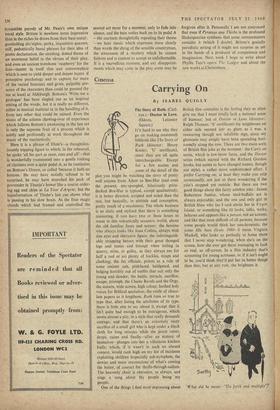Cinema
Carrying On
By ISABEL QUIGLY The Story of Ruth. (Carl- ton.)—Doctor in Love.
(Odeon, Leicester Square.) IT'S hard to see why they go on making mammoth biblicals like The Story of Ruth (director : Henry Koster; `1J' certificate), since they are all quite interchangeable. Except for a few names and some of the detail of the plot you might be watching the story of pretty well anyone from Adam to Ben-Hur (and even the present, star-spangled, hilariously prize- decked Ben-Hur is typical, except qualitatively; it is better directed, scripted and acted than the rest, but basically, in attitude and conception, pretty much of a muchness). The whole business is so static and stylised that there is something reassuring, if you have two or three hours to waste in this volcanically eccentric world, about the old familiar faces and scenes : the heroine who always looks like Joan Collins, always with sloe eyes and obtrusive figure; the indistinguish- ably strapping heroes with their great thonged legs and tunics and (except when toiling in quarry, mine, or galley, as they always are for half a reel or so) plenty of buckles, straps and clanking; the fat officials, priests as a rule of some sinister cult, pinkfaced, baldpated, and bulging horribly out of outfits that suit only the young and slender; the battle, miracle, sacrifice, escape, triumph, the Chaste Revels and the Orgy, the sunsets, wide screen, high colour, hushed holy voices for Biblical quotation; the rustle of choco- late papers as it lengthens. Ruth runs so true to type that, after listing the attributes of its type, there is little else to say about it, except that it isn't quite bad enough to be outrageous, which seems almost a pity, in a style that, really demands outrage; and that there's an extremely nasty sacrifice of a small girl who is kept under a black cloth for long minutes while the priest raises, drops, raises and finally—after an ecstasy of hesitation—plunges into her a villainous kitchen knife; which, if it wasn't in such an absurd context, would rank high on my list of incidents exploiting children (especially sub-nymphets, the dewier, and more unconscious 'of what's coming the better, of course) for thrills-through-sadism. The heavenly choir is obtrusive, as always, and sings a song about thy people being my people.
One of the things I find most depressing about British film comedies is the feeling they so often give me that I must totally lack a national sense of humour; but at Doctor in Love (director : Ralph Thomas; `A' certificate) my neighbours on either side seemed just as glum as I was, a reassuring though not infallible sign, since my glumness may simply have been spreading hori- zontally along the row. There are two main sorts of British film joke at the moment: the Carry on series, which is low-brow farce, and the Doctor series (which started with the Richard Gordon books, but seems to have changed names, though not style), a rather more sophisticated effort. I prefer Carrying on; at least they make you yelp occasionally, not just sit there wondering if the rain's stopped yet outside. But there are two good things about this fairly sombre joke: James Robertson Justice, whose mad-buffalo act is always enjoyable; and the one and only girl in British films who (as I said about her in Virgin Island, or something like it) looks, talks, walks, behaves and appears like a person, not an actress; and like that most difficult of all persons, because some people would think her anachronistic, the Pune fille been elevee 1960-1 mean Virginia Maskell, who looks so perfectly at home there that I never stop wondering, when she's on the screen, how she ever got there managing to look so real, so off-screen. In a film industry that's screaming for young actresses, or if it isn't ought to be, you'd think they'd put her in better things than this; but at any rate, she brightens it.
'What did he mean—"Go forth and multiply"?'






















































 Previous page
Previous page